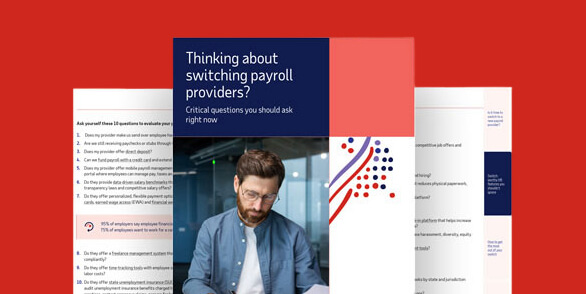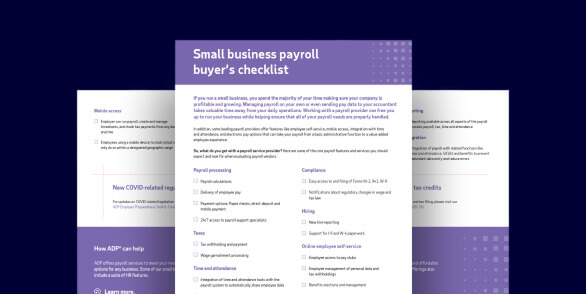Franchise employees, much like workers in any other type of business or industry, are paid by their employer. In most cases, this is the franchisee, but in others, it’s the franchisor. Those in the franchise business should know the full extent of their payroll responsibilities.
Do franchise owners pay employees?
Franchise owners, or franchisees, generally pay their own employees. If the franchisor provides payroll services, it usually will be stated in the franchise disclosure document, also known as the FDD.

What if the franchisor is a joint employer?
In a joint employment arrangement, the franchisee and the franchisor may both be responsible for payroll and both could be held accountable if a compliance violation occurs. Franchisors may also oversee the hiring process, work schedules and employee records. Employers who want more information on how joint employment might impact their business operations should seek legal counsel.
How do franchise employees get paid?
Franchise owners have several ways to pay their employees, as long as they abide by the laws and regulations governing payment methods. Options with pros and cons include:
- Paychecks
Paychecks are ideal for employees who want to maintain the privacy of their bank account. They can easily be lost, however, and printing and delivery fees increase payroll expenses for employers. - Direct deposit
The most common payment method today, direct deposit is more convenient and secure than paychecks, but is not ideal for employees who don’t have a bank account. There is also typically a set-up fee charged to the business. - Paycards
Alternative pay is attractive to new generations of workers that appreciate faster access to their income. On the other hand, paycards may have maintenance fees and employers generally cannot offer them as the only method of pay.
How are tips paid to franchise employees?
Where allowed, franchise owners may require their employees to participate in a tip pool, in which a portion of the tips collected are shared among the staff. Such tip pools may be available to both employees who are traditionally tipped and those who are not, depending on if the employer takes tip credits. Managers, supervisors and employers themselves are excluded. In addition, tip pools cannot result in an employee earning less than minimum wage. These rules are in accordance with the Fair Labor Standards Act (FLSA), but some states have their own tip pooling laws, which regulate the practice further or prohibit it entirely.
How often do franchise employees get paid?
Common payment schedules for franchise employees are weekly and bi-weekly. Semi-monthly is also sometimes an option, although it’s not as ideal for hourly workforces. Preference alone, however, is not the deciding factor because most states have laws dictating a minimum payroll frequency.
Are franchise owners also employees?
Although franchisees operate under the trademark of a parent company, they generally are considered separate business entities from the franchisor. However, under certain circumstances, franchise owners and franchisors may be considered joint employers. If there are questions about employment status, it’s best to consult legal counsel.
How do franchise owners get paid?
Franchise owners can pay themselves a salary or depending on their business entity, they may be able to take a draw from their accumulated equity. The latter is usually only an option for limited liability corporations (LLC), S corporations, sole proprietorships and partnerships. Owner draws affect working capital and have tax implications so franchise owners should consult a financial advisor or tax attorney before paying themselves in this manner.
Who is responsible for payroll – the franchisor or the franchisee?
Either the franchisee and/or the franchisor may be responsible for payroll, depending on the details of the franchise agreement and if a joint employment relationship exists. In some cases, to maintain uniformity or to take advantage of bulk purchasing, a franchisor may recommend its franchisees pay their employees using a particular vetted and approved payroll software. In other situations, franchise owners may have complete freedom to choose whatever payroll method they see fit.
Choosing a payroll system
Franchise owners who value their time and want to focus more attention on running their business and less on administration tend to outsource payroll and look for software that:
- Integrates seamlessly with time and attendance programs to help maintain compliance with wage and hour regulations
- Accommodates multiple pay rates, locations and payment methods
- Has self-service features so employees can access pay stubs and view time off balances without managerial assistance
- Allows payroll to be run from anywhere, not just franchise locations, at any time and on any device
- Simplifies tax calculations and payments to state and federal agencies
Running payroll and paying employees with help from ADP
ADP offers payroll and HR solutions that benefit franchisees and franchisors alike. First-time franchise owners appreciate how fast and easy we make running payroll, allowing them to concentrate their efforts on growing their business. They also enjoy the confidence in knowing that ADP serves over 30,000 franchisees of all sizes. Franchisors, meanwhile, find peace of mind knowing that our compliance support, including HR training and webcasts, helps protect the brand they worked so hard to build.
Learn more about our services for franchise businesses
This guide is intended to be used as a starting point in analyzing an employer’s payroll obligations and is not a comprehensive resource of requirements. It offers practical information concerning the subject matter and is provided with the understanding that ADP is not rendering legal or tax advice or other professional services.





